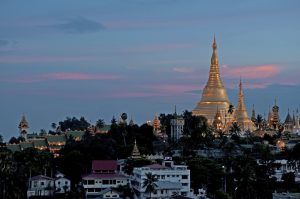China yesterday reported its highest daily toll of COVID-19 infections since January, driven by a sudden increase in infections in Yunnan province, where cases are spilling across the border from Myanmar.
The National Health Commission reported 65 new confirmed cases on Monday, up from 31 the day before. As Reuters noted, this was the most since January 30, when 92 new cases were reported.
According to the Commission, imported infections accounted for most of the new cases reported on Monday, with Yunnan reporting 41 new cases originating from abroad, all of whom were Chinese nationals returning from Myanmar.
The current outbreak in Yunnan started earlier this month, and has been concentrated in Ruili and Longchuan, two small cities perched on China’s 2,200-kilometer border with Myanmar. Visiting Ruili on Sunday, Yunnan provincial Vice Governor Zong Guoying promised to establish a “fortress of iron” to stop further transmissions from Myanmar.
The small Chinese outbreak hints at the extent of the outbreak in Myanmar, and the risk that the crisis-hit country could become, as the U.N.’s special rapporteur for human rights in Myanmar put it last week, a “COVID-19 super-spreader state.”
The country registered a record 281 COVID-19 deaths on Monday, and 5,189 new infections, state-run MRTV Television reported. But these are almost certainly an underestimate given the lack of testing and contact tracing, which have fallen off the cliff since the military coup of February 1, when doctors and health care workers walked off the job in protest against the self-appointed military government.
While infections remained surprisingly contained in the months immediately following the coup, cases began rising in late June, and efforts at mitigation have been compromised by the severe political crisis that has ensued, and the military’s violent repression of the mounting opposition to its rule.
Since seizing power, “the junta’s forces have killed, detained, and threatened medical professionals, attacked ambulances, clinics and social workers, destroyed and looted medical equipment, and occupied hospitals,” the Supreme Advisory Council on Myanmar (SAC-M) claimed in a statement on July 16. Recent weeks have also brought reports that the junta has seized oxygen cylinders as the COVID-19 crisis escalated and has effectively used the scarce resource to extract compliance from the virus-hit population.
“The junta is weaponizing COVID-19 for its own political gain by suffocating the democracy movement and seeking to gain the legitimacy and control it craves – and has so far been denied – by deliberately fueling a humanitarian disaster and then co-opting the international response,” said Yanghee Lee of SAC-M, a former U.N. special rapporteur on the situation of human rights in Myanmar.
Dr. Zaw Wai Soe, the leader of the COVID-19 taskforce in Myanmar before the coup, and health minister of the opposition National Unity Government (NUG), told Radio Free Asia this week that without timely intervention, “it is possible that more than 300,000 or up to 400,000 lives could be lost” to COVID-19 in the months to come.
Given the displacement of tens of thousands by Tatmadaw assaults in ethnic minority regions of the country, and the generally porous nature of the country’s borders with India, China, and Thailand, Myanmar’s outbreak seems set to impact untold numbers of people in the wider region. If the coup crisis itself did not prompt more concerted international efforts to resolve the crisis, the public health implications certainly should.
“Myanmar borders on nearly half the world’s population,” the author and historian Thant Myint-U tweeted on July 18. “The borders are porous. COVID in Myanmar is now out of control. A failed state can’t bring COVID under control. New Myanmar COVID variants could threaten the world. Global cooperation to help Myanmar is more urgent than ever.”

































